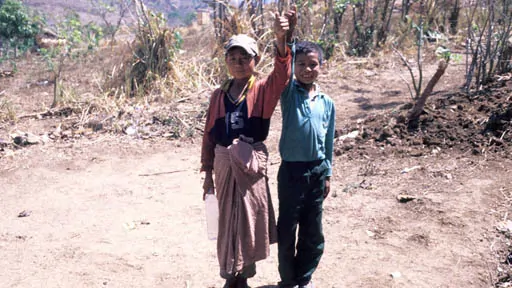Indigenous Calendar March, 2010: Karen Boys, Clean Water and a Local Hero

Inle Lake is one of Burma's (Myanmar's) most popular tourist attractions. A calm lake, it affords opportunities for just about everyone — to see rare birds, floating markets, souvenir shops, pagodas, indigenous villages and even an orphanage where you can volunteer. Nyaung Swhe is the main town and is where most people base themselves, as I did.
While there are many different indigenous groups in the immediate area, most foreign visitors are familiar mainly with the Intha. This is because they live mainly around (and on) the lake itself and because they are famous for having invented a unique rowing technique that is fascinating to see. But if you're willing to spend a full day — or longer — and hike in the sweltering heat, you'll be rewarded by being able to visit three, four or more different indigenous groups.
I'd hired a local guide for three days to do just that. The first two hours of the first morning were spent buying the supplies we'd need for the next three days. I bought only a one-liter bottle of water since I was traveling with a water filtration pump.
The first village was only about a one-hour walk away but, by the time we reached it, I'd already drunk that entire liter of water. Immediately after my guide had introduced the two of us to the first Karen villagers we met, I asked where I could find water to drink. I was shown a near-by trough and I started to set up my filtration pump to purify it for drinking. It did not surprise me that the villagers had no idea what I was doing. What did surprise me was the interest level they showed (more arriving by the minute to see this "strange" behavior by a foreigner) along with the fact that my guide also had no idea when I asked him to explain. As soon as he translated the part "... so if I drink this water like you do I will get sick" there started a series of conversations among the (now many) gathered villagers.
"Sick" was the magic word and I was asked if I would look at two young boys in the village who had fallen sick a few days earlier. Despite no formal medical training I was very sure that both boys were suffering from a pretty bad stomach bug. For the next hour the villagers took turns pumping a three-day supply of clean water for the boys while I made them a light soup (they hadn't eaten for a few days) and gave basic hygiene instructions to their mothers. I agreed to return in three days with a willingness to take the boys to a doctor in Nyaung Swhe if they were still not well.
About half way to the same village three days later it suddenly occurred to me that if these boys weren't better — or were more sick than before — I would surely be blamed. I spent the next half hour quite worried about the prospect. In the end I was given a hero's greeting. The boys had been back on their feet and playing again the very next day. The villagers insisted that I stay a few hours and eat with them, although I think their main motivation was to be able to pump more clean drinking water. I'll always think that they believed the pump put some kind of magic medicine into the water and that I was some kind of magic doctor!
If you enjoyed reading this article, please consider supporting independent, advertising-free journalism by buying us a coffee to help us cover the cost of hosting our web site. Please click on the link or scan the QR code. Thanks!


